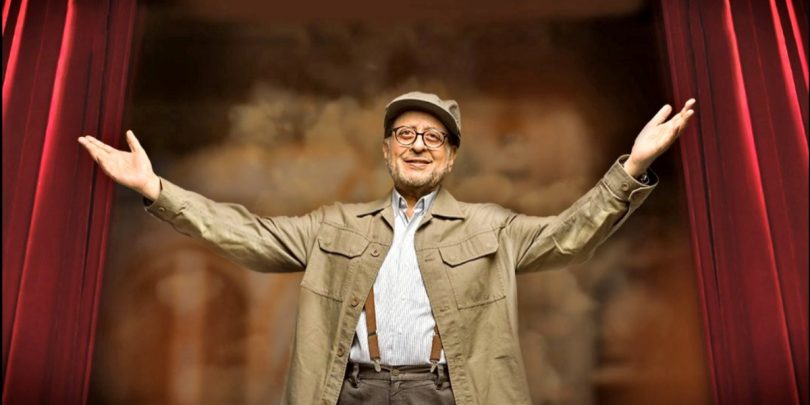ed because of his body of work, the way he carries himself, and the amount of respect he generates for just being there. Pakistan is lucky to have film star Nadeem who is not just a legend but also one of the most sought-after actors the country has ever produced. Everyone knows that he came into the film industry in 1967, and debuted as a leading man in Chakori but there is more to Nadeem than meets the eye. For starters, the name his parents gave him is not Nadeem, and you can find similar facts about him below:
1. The name’s not Nadeem!
He might be known as Nadeem today but the actor was born Mirza Nazeer Baig on June 19th, 1941, in the Indian city of Vijayawada. His family moved to Pakistan after Independence and settled in Karachi, where Nadeem completed his education and became a prominent feature on the music scene. Although he was friends with many actors and singers who went on to become famous, he stayed away from TV until it was inevitable. As for the name change, he was ‘Nadeemed’ when he entered films through Chakori and that stuck to him just like Dilip Kumar stuck to Yousuf Khan.
2. Began career on TV … as a vocalist!
Before entering films, Nadeem was part of the Pakistan Television Network’s Dhaka Center as a vocalist. He used to sing songs in both Urdu and Bangla – two of the most spoken languages in the country at that time – and made a name for himself, thanks to his colleagues’ support. His future father-in-law film director Ehtesham spotted him through one of these shows and asked him to enter films, but since Nadeem wasn’t fond of acting, he rejected his offer politely and told him he was content with his singing gig.
3. Used to work in an advertising agency before his film debut
At the time when director Ehtesham offered Nadeem to become part of his film Chakori, the future actor was working at an advertising agency in Dhaka and was happy with his life, since his father was working at nearby Sylhet. However, when Nadeem’s boss at the agency Zahir Raihan (director of Sangam, the first-ever Urdu film in color) got to know of the offer, he assured Nadeem that he should try acting in films and if he was worried about losing his job, he can go on a two-month vacation, and return if he didn’t find himself suitable for films.

4. Became his debut film’s ‘hero’ by accident
Nadeem might have played the protagonist in Chakori but he wasn’t the first choice to play the hero. Despite his likeness to Bollywood star Dilip Kumar, Nadeem was asked to be the villain to Azeem’s hero but once the latter went ‘missing’, the director asked Nadeem to change sides and play the hero opposite Shabana. After all, he had already sung Kahan Ho Tumko with Firdausi Begum for the movie, and it would have been surprising had the most striking face in the cast been wasted as the villain. The rest, as they say, is history!
5. Played the triple role long before Dilip Kumar, Amitabh Bachchan
Unlike his contemporaries, Nadeem acted in all kinds of films during his first four years; he was popular both in West Pakistan and the Eastern wing which was amazing since his contemporaries were either popular in what’s Pakistan today, or the part that went on to become Bangladesh. All his films produced in either East or West Pakistan are still considered classics because he chose to break barriers instead of staying within them. In 1971, he played three characters in East Pakistan-produced Jaltay Sooraj Ke Neeche, long before his idol Dilip Kumar (Bairag) and contemporary Amitabh Bachchan (Mahaan) did so in India.
6. Was the villain in not one but two flicks
Usually ‘heroes’ in both India and Pakistan play villains when they are either past their prime or not getting good-guy roles. However, Nadeem played villains in two films in his prime and was hated for playing both the characters. In Samaaj, he played a playboy who destroyed the lives of young girls and moved ahead whereas, in Suhaag, he played breathed life into the character of a bitter ex, who wouldn’t leave the heroine Shamim Ara alone, despite her marriage to a mature and sensible Zia Mohyeddin. Both the films came out in the early 1970s but even after 50 years, people look to Nadeem’s performance when they want to play a subtle, handsome and vengeful villain.
7. Acted in 3 films with Waheed Murad, Mohammad Ali
During the course of his career, Nadeem has been compared to many actors across the world but his most fierce competition was at home with fellow actors Mohammad Ali and Waheed Murad. Together the trio did as many as three films together – Shama, Jab Jab Phool Khile and Phool Mere Gulshan Ka – and they all were very successful at the box office. Since Mohammad Ali was senior to both Waheed Murad and Nadeem, he got the bigger roles in three films, but Nadeem’s performance was lauded by all in each film as he stood his ground against the more senior ‘heroes’.
8. Sang over 50 songs during his career
The singer in Nadeem might not have done as well as the actor but Nadeem’s love for music continued throughout the 1970s, 1980s, and the 1990s. Long before Amitabh Bachchan or the Khans in India did their own playback, Nadeem had been there and done that in style. Be it his debut film Chakori, his first as a producer, or simply as an actor, he got the job done when approached to sing. Even in the 1990s, he sang a patriotic song Hum Sab Hain Lehren for Pakistan Television and it was a huge hit. The song is still aired on national television on patriotic days and during election transmissions.
9. Sang as a playback singer, for another actor
His love for playback singing made him do something that no one had done before him – he even sang a song Zinda Hoon, Zinda Hoon in Mr. Buddhoo where he did playback singing for his colleague Qavi Khan. Nadeem was not part of the film in any capacity yet when one singer was required to give support to Ahmed Rushdi and Mala, music director Kamal Ahmed asked Nadeem to sing, and the song went on to become a huge hit. It was filmed on Qavi Khan, Deeba, and Rangeela, with Ahmed Rushdi providing vocals for the comedian.
10. Switched his hairstyle to stay relevant
Nadeem is one of the few actors who have entertained generations as the leading man; unlike his contemporaries, he is the favorite actor of all those who grew up in the 1960s, 1970s, 1980s, and even the 1990s. How he managed to stay relevant in these decades is because of his ability to adapt. During one movie in the late 1970s – Pakeeza – he changed his hairstyle for the first time because the character he was playing lost his memory. He returned to the same style when he did Nazrul Islam’s Bandish one year later and stayed with the same hairstyle. His previous hairstyle represented the 1960s and the 1970s while the current one has helped him remain cool amongst the newer generation, without doing much.
11. Shared the screen with Raj Babbar, and Parveen Babi during the 1980s
Nadeem’s popularity was not just limited to Pakistan but he was quite popular in the whole of South Asia. The way he proved his credentials in the Indo-Canadian-Bangladeshi flick, Door Desh aka Gehri Chot made him even more popular than the reigning actors of those countries. Not only did he stand his ground in front of Shashi Kapoor, David, Sharmila Tagore, Raj Babbar, and Parveen Babi, but also showed the audience that in order to play the angry young man, you don’t have to look angry but act like one. Some might call his character ‘minor’ but it was the most impactful one since the climax of the film revolved around ‘Tony’, the character he made his own.
12. Played young to old characters in his 40s
Actors in this part of the world continue to play leading men in their fifties because they feel that if they switch to older roles, they might lose their standing as a hero. Nadeem was one of the few actors in Pakistan who chose to play older characters when he was in his forties. He didn’t shy once while playing a father figure to Faisal Rehman (Naraaz, 1985) and Shaan Shahid (Bulandi, 1990) both of whom went on to become huge names in the industry.
13. Produced one of the most thought-provoking films
During the 1970s, Nadeem turned producer for just one film – Mitti Ke Putley – that was based on an incident that took place in Karachi, where six factory workers were killed by the police on two separate days. He played the foreign-returned protagonist in the movie which revolved around the lives of workers and highlighted their plight and issues they had to endure. The film didn’t do well at the box office because of its delay and change in directors but is now considered a classic after fifty years because of its bold theme.

14. Had a stint as an actor, singer, and producer in Punjabi cinema
After a gap of more than 15 years, Nadeem once again returned to production with the Punjabi flick Mukhra which also launched him as a leading man in the regional industry. He played a village bumpkin in the movie where Babra Sharif played his love interest, while Samina Peerzada and Ismail Shah were also part of the cast. The film was successful at the box office and gave Nadeem a chance to sing a duet Munidya with the one and only Madam Noor Jehan which was recently recreated in the Coke Studio.
15. Worked in two Indian-inspired films that were later copied in India
Nadeem has had the distinction of working in not one but two blockbuster flicks in Pakistan, that were ‘inspired’ versions of multiple Bollywood flicks themselves. Both these films – Aaina in 1977 and Faisla in 1986 – were later copied in India as Pyar Jhukta Nahi and Paap Ki Duniya in the 1980s. The characters Nadeem played in those films were recreated without much change by Mithun Chakraborty and Sunny Deol, who might have been good but weren’t as cool as the Pakistani actor.
16. Rajesh Khanna copied multiple Nadeem flicks to save his career!
That’s not all, Nadeem and Rajesh Khanna began their careers together; while the Pakistani actor continues to be a force to reckon with, Rajesh Khanna’s monotonous acting derailed his career after a few years. In the 1980s he tried to revive his career by aping Nadeem in films like Adhikar, Oonchay Loag, and Alag Alag which were rip-offs of Nadeem’s Qurbani, Dehleez, and Meherbani. Not only were the original dialogues used in the Indian flick, the songs were also plagiarized so badly that the films bombed at the box office.
17. Didn’t stop working with his earlier heroines like his contemporaries
Contrary to popular belief, Nadeem didn’t change his heroines as he grew older but took them with him with the passage of time. He debuted in films with Shabana in Chakori (1967) and continued to be her hero till the 1990s when they both appeared in Aandhi (1991) as the leading pair. The same thing happened with Shabnam who was Nadeem’s heroine for more than 25 years – from Nazneen in 1969 to Awargi in 1995 and looked so good together that many didn’t notice when one of their earlier songs was fitted in the movie as a flashback! He also worked extensively with Babra Sharif and delivered countess hits during their association from Intezar (1974) to Shehzada (1992).
18. Played leading men to actresses who were born after his film debut!
While many of his contemporaries both in Pakistan and across the border stopped playing the leading man, Nadeem continued to do so because of his charming personality. At the age of 58, he made his TV debut as an actor and shared the screen with actors like Rehan Sheikh, Nosheen Tariq, Amna Haq, and Maya Khan, in Bisaat. He played the elder brother of Rehan Sheikh and Maya Khan, and played the romantic lead opposite Amna Haq and Nosheen Tariq, all of whom were born after Nadeem’s debut in films. He also played the leading man opposite Natasha Hussain in Chupke Chupke which also featured Captain Abdullah Mehmood of Alpha Bravo Charlie fame as the second lead.
19. Won the highest number of Nigar awards during his career
Last but not the least, Nadeem also bagged as many as 17 Nigar Awards for Best Actor during the first 25 years of his career, after which he requested the organizers to stop considering him for the award since it was not beneficial for upcoming actors. His feat hasn’t been broken since his last award in 1991, and is unlikely to be bettered since Nigar Awards last took place in 2003. His achievement can be judged from the fact that his contemporaries Mohammad Ali (8 wins) and Waheed Murad (4 wins) received 12 awards combined, and still fall behind by five to Nadeem.







